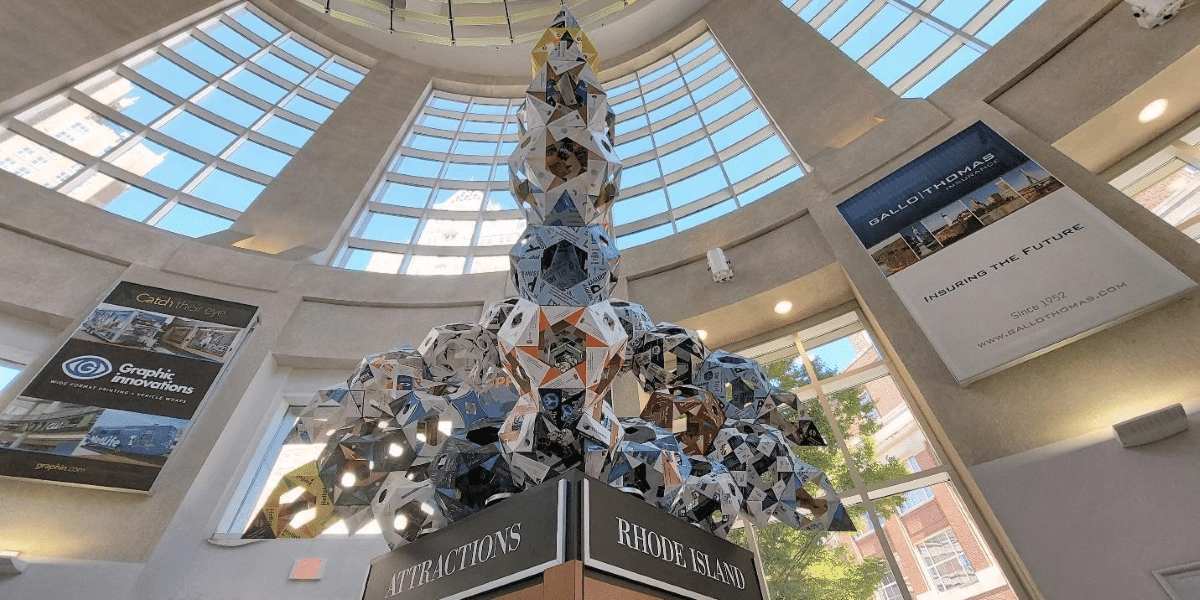In an age where the digital world increasingly encroaches upon the tangible, one might assume that traditional business cards have found their place among relics of a bygone era. Yet, astonishingly, in the United States alone, an estimated 10 billion business cards are printed annually. This figure comes with a startling revelation—9 billion of these cards end up as waste, often without ever leaving their pristine boxes. This cycle of production and disposal not only epitomizes the inefficiencies plaguing modern consumerism but also underscores a pressing environmental dilemma.
Enter the MeconoMorph project—a visionary initiative that stands at the confluence of art, sustainability, and community. Spearheaded by Viktor Genel, an artist with a profound appreciation for the potential within everyday objects, MeconoMorph challenges societal norms by transforming discarded business cards into monumental sculptures. This concept is not merely about recycling; it’s about reimagining waste as a canvas for collective creativity.
The grandeur of MeconoMorph can be likened to the ambitions behind the biblical Tower of Babel—a myriad of individuals from diverse backgrounds uniting in their efforts to construct something transcendent. However, unlike its ancient counterpart, which symbolized human hubris leading to division, MeconoMorph embodies collaboration towards a harmonious and sustainable future.
Large institutions and corporations are particularly culpable in the mass wastage of business cards. Every time an employee departs or a branding update occurs, thousands—sometimes millions—of obsolete cards are consigned to landfills. Here lies the ingenuity of MeconoMorph: it offers an alternative destiny for these neglected artifacts. By aggregating them into sculptures displayed in public spaces, these bits of cardboard are given new life and purpose.
The environmental implications are profound. Consider the comparison between a MeconoMorph sculpture and a traditional bronze statue of comparable size—the latter’s production entails significant carbon emissions and resource depletion. In contrast, MeconoMorph has what its creator describes as a “negative” carbon footprint; it not only prevents waste but does so through communal artistic expression.
The movement is gaining traction across social platforms (linktr.ee/vgenel), where participants share their contributions to this growing tapestry of reclaimed beauty. Each card added is both an act of preservation and a statement against unsustainable practices that pervade our daily lives. Globally exhibited in various venues and public spaces, these sculptures do more than please the eye—they serve as active forums for networking and dialogue, exploring the role of art in promoting social change. MeconoMorph’s journey includes several notable displays, such as the “Raptor” at the Providence Visitor Center, which drew thousands of business cards from visitors keen to be part of this evolving narrative. Additionally, new ‘seeds’ of MeconoMorph are sprouting in Vero Beach, Florida—like the “Tree of Life – Bonsai” at the Vero Beach Outlets and the “Pagoda” at the Vero Beach Art Club, each crafted from cards collected from local businesses and artists. The latest and most significant installation has now taken residence in the lobby of Riverside Theatre, marking another milestone for Florida’s largest professional theater.
“MeconoMorph is my way of unveiling the artistry behind everyday objects,” states its creator, Viktor Genel, encapsulating the project’s ethos succinctly. It invites us all to look beyond an object’s intended function and envision what could be if we collectively decide to step away from disposability towards enduring value. The essence of MeconoMorph transcends its aesthetic value; it encapsulates a deep commitment to sustainability and collaborative effort. Viktor Genel explains, “MeconoMorph leverages seemingly insignificant items to craft a tapestry of connection and creativity,” highlighting the potential of simple objects to drive substantial positive change. This principle strikes a chord in our current context, where waste management and environmental sustainability are critical challenges, demonstrating how art can ignite shifts towards greener practices.
For journalists seeking stories that resonate with contemporary concerns around sustainability and community-led initiatives, MeconoMorph presents a compelling narrative arc. It’s not just about reducing waste; it’s about how creativity can bridge divides and foster unity in pursuit of ecological stewardship.
MeconoMorph has nurtured a broad network that spans artists, business moguls, environmental advocates, and casual contributors, each adding their unused business cards to the mix. This element of collaboration emphasizes the project’s capacity to foster unique connections across diverse sectors, transforming individual contributions into a collective conversation about creativity and environmental stewardship. As more people join this crusade against wastefulness through artistic endeavor, one can’t help but wonder about the ripple effects on other industries plagued by similar issues of excess and disregard for environmental impact.
The challenge now lies in amplifying this message—encouraging more individuals and organizations to partake in or support such sustainable cultural projects. As awareness grows, so too does hope that initiatives like MeconoMorph can herald a shift toward more mindful consumption patterns across society.
This movement is more than an art project; it’s a testament to human ingenuity when faced with seemingly insurmountable challenges—a beacon signaling pathways towards more sustainable futures through collective action.
In essence, MeconoMorph transcends its physical manifestations; it becomes a metaphor for possibility—an emblematic Tower of Babel for our times—not reaching skywards to defy divine will but grounded in earthly concerns aiming to inspire change through unity and shared vision.
As we navigate through complexities inherent in modern lifestyles marked by rapid technological advancements and consequent ecological impacts, stories like that of MeconoMorph remind us that solutions often lie within our grasp—requiring only imagination, collaboration, and determination to bring them into being.
Media Contact:
Viktor Genel
Phone: +15084515071
Email: genel_collection@yahoo.com
Linktree: Viktor Genel
Published by: Holy Minoza


















